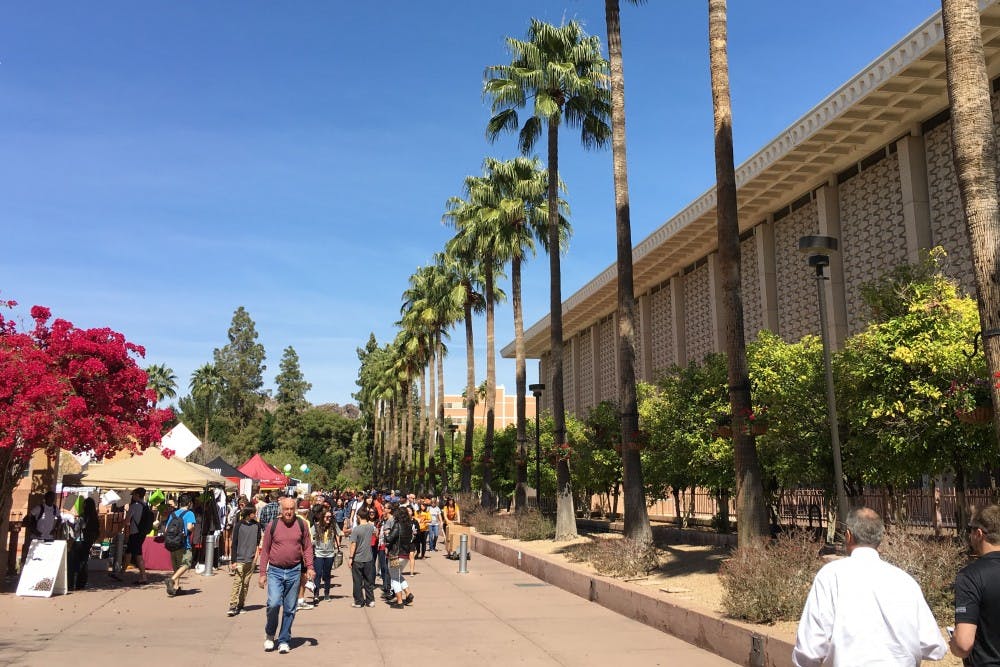Here at ASU, walking between classes can mostly be characterized in two ways: hot and crowded. This place is a nightmare for an introverted ginger, such as myself.
Everyday I die a little bit inside, walking past tan people in frilly short shorts and muscle tees, into the oppressive sun, and pushing my earphones in a little more snugly to escape.
So I have to ask, can we do better?
Introducing, the newest innovation this world has to offer, established since ancient times and the best investment money can buy:
Drum roll, please.
...plants.
That’s right, some of us like plants. In fact, some of us like to hug plants and some of us even talk to plants. Or maybe that’s just me.
Either way, we can all agree that a little shade and clean oxygen is something necessary for desert city survival.
Particularly, we can agree on this because it is proven. Plants provide cleaner air and reduce the urban heat island effect, which is common in congested cities.
Besides this, plants are restorative and therapeutic. They are known to greatly reduce stress.
I would like to see more vegetation on campus. (I actually like to see more vegetation than people). For this reason, I am thrilled to share a contest getting started here at ASU that challenges students to make a biophilic design for campus.
Now, you may be wondering, what is biophilia?
According to one of the contest creators, sustainability practices department coordinator senior Lesley Forst, biophilia, “refers to human’s innate connection with nature.”
We can engage in biophilia by simply getting out into nature, or as Forst describes as her vision for the contest, we can foster biophilia, “by bringing nature into our human-built spaces with biophilic design incorporates natural elements or natural patterns.”
"Studies have shown that when people have access to green space or they have nature (or natural elements) in their homes, offices and community spaces, they report feeling less stressed, happier and more creative," Forst said.
Nature can be very healing and innate to our human condition.
"They’ve also done some studies in hospitals showing that when patients were surrounded by nature, their overall mental state improved, which can help with recovery from illness," Forst discussed.
Clearly, ASU needs more shade, and there is a lot of research that suggests we can make ASU more walkable with built shade structures or with vegetation, but why not incorporate both with biophilic design?
If you have ever checked out designs on the Metro light rail or in Phoenix, then you may have already seen biophilia without even realizing it.
Student sustainability worker and major, Ashley Knudsen, explains how Phoenix is already implementing these efforts: “'Biophilic Phoenix' is a project to increase designs and awareness of projects like this across the Phoenix-Metro area — on multiple scales of our city and built environment.”
This contest puts the power in student hands to craft a stress-reducing, aesthetically pleasing environment on campus.
For some this may mean a breath of fresh air. For others this may mean daydreaming into the fractals of leaves. For me, personally, this means more green friends to greet with kisses and wishes on my way to class.
Reach the columnist at ralydfor@asu.edu or follow @ralydford on Twitter.
Editor’s note: The opinions presented in this column are the author’s and do not imply any endorsement from The State Press or its editors.
Want to join the conversation? Send an email to opiniondesk.statepress@gmail.com. Keep letters under 300 words and be sure to include your university affiliation. Anonymity will not be granted.
Like The State Press on Facebook and follow @statepress on Twitter.




